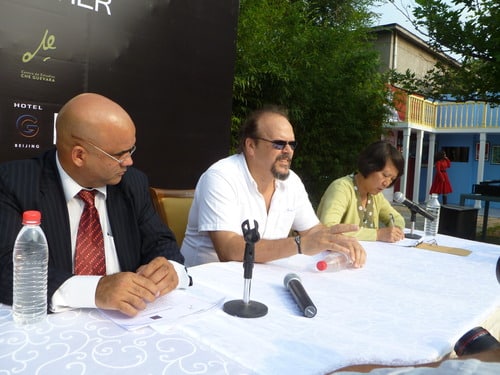Yesterday, I met Camilo Guevara, the son of Che himself. Mr. Guevara was in Beijing helping curate a traveling exhibit of his father’s photographs. The day before the grand opening, he held a press conference at the art gallery hosting the collection.
I rode the bus to the nexus of Beijing’s art scene, the 798 District, whose abandoned weapons factories now house art in every medium. As I signed in, receiving a gift bag with a 750ml bottle of Havana rum, the receptionist told me that the event was delayed 30 minutes to accommodate late arrivals. “In the meantime,” he added, “please have a drink and enjoy the beautiful weather!”
Having arrived early, I had nearly an hour to people-watch. Several embassy bigwigs showed up, the Cuban flag pins and diplomatic license plates dead giveaways. I heard one Hispanic photographer use broken Mandarin to tell a Chinese woman that his father fought in the revolution alongside Che. All of the Cubans were impeccably dressed. Figuring one mojito from the open bar wouldn’t leave me incapacitated. I ordered one and found a piece of shade, the smoke from Cuban cigars dancing in the afternoon sunshine.
Che’s son appeared onstage, not from anywhere in particular, and the crowd took their seats. Half a dozen photographers unabashedly crouched beside him, their shutters clacking like pebbles on a tin roof. Swallowing my shame, I charged forth with my meager point-and-shoot, snapping a few shots before retreating to my pen and notepad.
Following several introductions, Mr. Guevara spoke obliquely about his father’s photographs. He used Spanish, which was then translated into Mandarin. I often feel ashamed for never having learned Spanish, and that sentiment multiplied tenfold listening to Che’s son. Finally, the floor was opened for questions. As no one was eager to go first, I thrust my hand skyward with much gusto, and asked a question about Cuban art.
From behind his jet-black sunglasses, Camilo Guevara was staring me down. Despite him speaking a language I could not understand, I knew before the Mandarin translation that he didn’t answer my question. In fact, he responded at great length to everyone’s questions, but he answered none of them. I wish he would have told us something about himself, or about the father he lost when he was only five.
But Camilo inherited the very public legacy of a man he never truly knew. Where he brings his father’s photographs is contingent on the events of many decades past. What parts of the present justify the colossal rifts in our global society? With blaring silence, he asked all of us to stop asking skeletons for answers, to forego the quest for context. Everything grew infinitely simpler.
The exhibit was fascinating. The mojitos were delicious. But I will never forget the feeling of Che Guevara’s son looking straight at me and telling me something I understand in a language I don’t.
就在昨天我遇到了卡米罗•格瓦拉,著名古巴革命家切•
我因为早到了一个多小时,所以我有很多时间去观察周围的人,
切的儿子出现在舞台上,这样的出场并没有什么特别的地方,
一些简单介绍之后,格瓦拉先生开始转弯抹角地谈起他父亲的照片。
从他乌黑油亮的太阳镜后面,卡米罗·格瓦拉盯着我坐下。
但是,
这次展览是非常有吸引力的。莫吉托鸡尾酒的味道很美。


![[Only in Beijing] The Revolutionary’s Son<!--:zh-->古巴的“红二代”](https://www.oneinabillionvoices.org/wp-content/uploads/2012/10/che-guevara-flag-651-p.gif)
